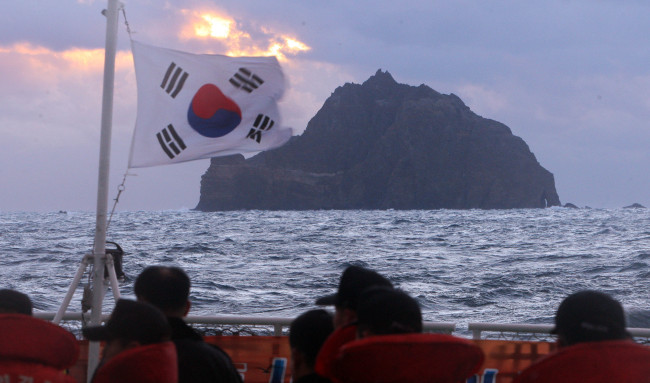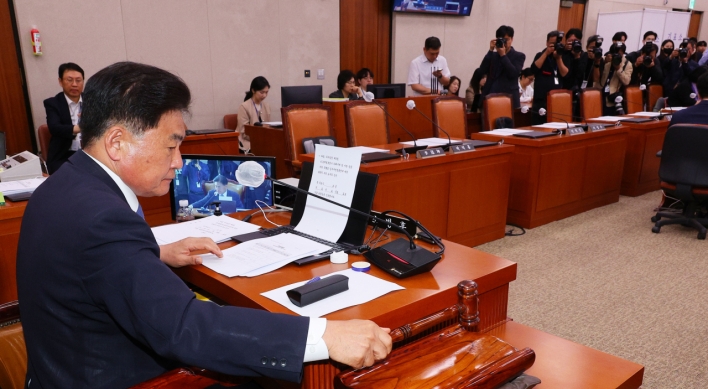Japan may replace ambassador to Seoul, transportation minister threatens to visit controversial shrine
President Lee Myung-bak’s trip to Dokdo on Friday is precipitating one of the biggest diplomatic crises in recent years between Korea and Japan in the latest twist to their volatile history often snowed under in territorial brawls.
Lee became Korea’s first leader to land on the easternmost islets of Dokdo. He dropped by the nearby Ulleungdo earlier in the day to meet with residents there.
Analysts say the unprecedented visit appears to reassure Seoul’s sovereignty over the rocky outcrops between the two mainlands and counter Tokyo’s increasingly assertive territorial claim.
“We should shake off the existing damage-causing attitude toward sensitive issues with Japan that is originated from the government’s discretion or fear of a thorn in bilateral relations,” said Lee Jae-young, a public administration professor at Kyungnam University in South Gyeongsang Province.
Despite Seoul’s efforts to keep the issue from derailing its ties with Tokyo, the latest assertion is feared to overshadow their strategic and economic cooperation and commitment to international efforts to curb North Korea’s nuclear ambitions.
Japanese Foreign Minister Koichiro Gemba and Chief Cabinet Secretary Osamu Fujimura urged Seoul to refrain. Transport Minister Yuichiro Hata announced plans to visit the controversial Yasukuni war shrine on Korea’s Aug. 15 Liberation Day.
Later in the day, the archipelago country summoned Seoul’s ambassador to Tokyo Shin Kak-soo to complain. It is also believed to consider calling in and replacing Muto Masatoshi, its ambassador to Seoul known for his Korea-friendly stance.
Critics see Lee’s trip as “poorly timed politicking.” It only inflicted tension between the two countries to no clear purpose and agitated public sentiment in the run up to the December presidential vote, they say.
“While agreeing in principle to the need for the president’s visit to Dokdo, I’d warn against a one-shot political event at a time when he has numerous tasks to settle such as the Yasukuni shrine and warchest-backed companies in Japan (that forcefully conscripted laborers during colonial rule),” Bang Hak-jin, secretary-general of the Institute for Research in Collaborationist Activities, told Yonhap News.
President Lee Myung-bak’s trip to Dokdo on Friday is precipitating one of the biggest diplomatic crises in recent years between Korea and Japan in the latest twist to their volatile history often snowed under in territorial brawls.
Lee became Korea’s first leader to land on the easternmost islets of Dokdo. He dropped by the nearby Ulleungdo earlier in the day to meet with residents there.
Analysts say the unprecedented visit appears to reassure Seoul’s sovereignty over the rocky outcrops between the two mainlands and counter Tokyo’s increasingly assertive territorial claim.
“We should shake off the existing damage-causing attitude toward sensitive issues with Japan that is originated from the government’s discretion or fear of a thorn in bilateral relations,” said Lee Jae-young, a public administration professor at Kyungnam University in South Gyeongsang Province.
Despite Seoul’s efforts to keep the issue from derailing its ties with Tokyo, the latest assertion is feared to overshadow their strategic and economic cooperation and commitment to international efforts to curb North Korea’s nuclear ambitions.
Japanese Foreign Minister Koichiro Gemba and Chief Cabinet Secretary Osamu Fujimura urged Seoul to refrain. Transport Minister Yuichiro Hata announced plans to visit the controversial Yasukuni war shrine on Korea’s Aug. 15 Liberation Day.
Later in the day, the archipelago country summoned Seoul’s ambassador to Tokyo Shin Kak-soo to complain. It is also believed to consider calling in and replacing Muto Masatoshi, its ambassador to Seoul known for his Korea-friendly stance.
Critics see Lee’s trip as “poorly timed politicking.” It only inflicted tension between the two countries to no clear purpose and agitated public sentiment in the run up to the December presidential vote, they say.
“While agreeing in principle to the need for the president’s visit to Dokdo, I’d warn against a one-shot political event at a time when he has numerous tasks to settle such as the Yasukuni shrine and warchest-backed companies in Japan (that forcefully conscripted laborers during colonial rule),” Bang Hak-jin, secretary-general of the Institute for Research in Collaborationist Activities, told Yonhap News.

Dokdo has long been a flashpoint due to ample fisheries and perceived large natural gas deposits and other resources. It comprises East and West Islets about 200 meters apart and surrounding reefs.
Lee’s visit may mark a shift from Korea’s longstanding policy to keep itself from entangling in Japan’s ambition to make Dokdo a disputed area and rally other countries behind its claim.
Late last month, the Korean government strongly protested Japan’s fresh claim to Dokdo in a defense paper. Tokyo also lodged a complaint early this week about Seoul’s new diplomatic paper describing the islets as its territory.
Many Korean scholars ascribe Japan’s persistent territorial claim to its imperial past that resulted in its illegal seizure of the islets a century ago.
At the height of the Russian-Japanese war in 1905, Japan clandestinely annexed Dokdo to install communication and surveillance devices and collect intelligence on Russian naval movements in the East Sea. Japan did return Dokdo to Korea after winning the war but rather pushed to occupy the entire peninsula.
Tokyo is also engaged in a quarrel with Moscow over a set of islands in Russia’s Far East ― known as the Southern Kuriles in Russia and the Northern Territories in Japan.
The Japanese government called in Russia’s envoy to protest after Prime Minister Dmitry Medvedev visited the area a month ago, calling it an “unforgiveable outrage.” It claims that Soviet troops took control of the islands illegally at the end of World War II.
“Dokdo is a symbol of Korean independence and sovereignty. It was more than 1,460 years ago in 512 A.D. that Dokdo became part of Korea’s territory,” Shin Yong-ha, a chair professor of sociology at Hanyang University in Seoul, said in a book published in 2009. He is president of the Dokdo Institute, a private research organization.
“In the 21st century, it will become possible to tap into its undersea and underground resources. It may provide a base point for an exclusive economic zone and extend the Korean territorial waters to 200 nautical miles (370 kilometers). Thus, its potential value in the future may not be insignificant,” Shin said.
Bilateral relations have also been beset by Japan’s recurring falsification of historical facts and failure to apologize to forced laborers from 1940-45 colonial rule and recent moves toward nuclear armament through legislative amendments.
The partnership was put to the test when Seoul called off the signing of its first military pact with Tokyo in June, amid fierce opposition by civic groups and opposition lawmakers.
Last August, the Korean government turned three Japanese hardline lawmakers who were seeking to visit Dokdo back home upon their arrival at a Korean airport.
In June 2011, the Japanese government temporarily banned officials from using Korean Air following the carrier’s test flight of its Airbus A380 jetliner over Dokdo, calling it “provocative.”
The U.S. and other experts call on the two rivals to cherish a future-oriented relationship instead of looking to the past and political maneuvering at home.
“In discussing the history issue, most Japanese and Korean interlocutors seem to agree on only one thing ― the ball is in the other’s court,” Ralph Cossa, president of the Pacific Forum CSIS, a Honolulu-based think tank affiliated with the Center for Strategic and International Studies in Washington, said a recent report.
“President Lee, along with his Japanese counterpart Prime Minister Noda Yoshihiko, has a golden opportunity to help Koreans and Japanese face the future with both eyes open by seeking and accepting outside mediation to put this cancerous issue behind (them) for the sake of both nations. Or he, and the people of South Korea (and Japan), can remain consumed and blinded by their tragic past.”
“We encourage good relations between both of our allies,” said Patrick Ventrell, acting deputy spokesperson of the U.S. State Department, when asked for comment on Lee’s planned visit.
By Shin Hyon-hee (heeshin@heraldcorp.com)











![[Kim Seong-kon] Democracy and the future of South Korea](http://res.heraldm.com/phpwas/restmb_idxmake.php?idx=644&simg=/content/image/2024/04/16/20240416050802_0.jpg&u=)





![[KH Explains] Hyundai's full hybrid edge to pay off in slow EV transition](http://res.heraldm.com/phpwas/restmb_idxmake.php?idx=652&simg=/content/image/2024/04/18/20240418050645_0.jpg&u=20240418155304)

![[Today’s K-pop] Zico drops snippet of collaboration with Jennie](http://res.heraldm.com/phpwas/restmb_idxmake.php?idx=642&simg=/content/image/2024/04/18/20240418050702_0.jpg&u=)